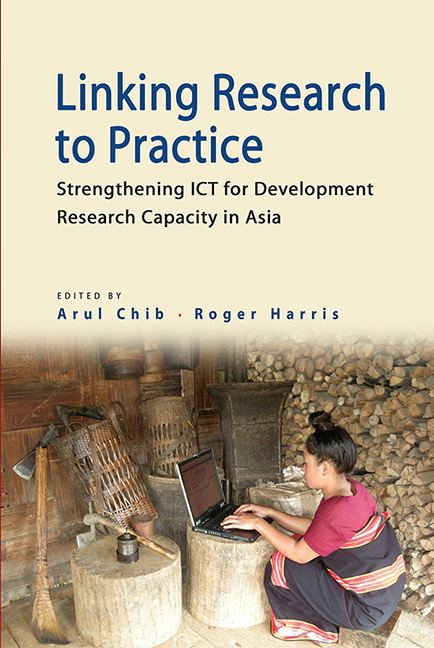Book contents
- Frontmatter
- Contents
- List of Tables
- List of Figures
- Foreword
- Preface
- Acknowledgement
- SECTION I MANAGEMENT PERSPECTIVES: INSIDERS' THOUGHTS ON THE PROGRAMME
- SECTION II RESEARCH PERSPECTIVES: THEORETICAL REFLECTIONS BY EXPERTS
- SECTION III RESEARCH OUTPUTS
- 11 It's the Talk, Not the Tech: What Governments Should Know about Blogging and Social Media
- 12 Integrating Digital and Human Data Sources for Environmental Planning and Climate Change Adaptation: From Research to Practice in Central Vietnam
- 13 The Challenge of Working Across Contexts and Domains: Mobile Health Education in Rural Cambodia
- 14 The Dynamics and Challenges of Academic Internet Use Amongst Cambodian University Students;
- SECTION IV SYNTHESIS AND CONCLUSION
- About the Contributors0
- Index
11 - It's the Talk, Not the Tech: What Governments Should Know about Blogging and Social Media
from SECTION III - RESEARCH OUTPUTS
Published online by Cambridge University Press: 21 October 2015
- Frontmatter
- Contents
- List of Tables
- List of Figures
- Foreword
- Preface
- Acknowledgement
- SECTION I MANAGEMENT PERSPECTIVES: INSIDERS' THOUGHTS ON THE PROGRAMME
- SECTION II RESEARCH PERSPECTIVES: THEORETICAL REFLECTIONS BY EXPERTS
- SECTION III RESEARCH OUTPUTS
- 11 It's the Talk, Not the Tech: What Governments Should Know about Blogging and Social Media
- 12 Integrating Digital and Human Data Sources for Environmental Planning and Climate Change Adaptation: From Research to Practice in Central Vietnam
- 13 The Challenge of Working Across Contexts and Domains: Mobile Health Education in Rural Cambodia
- 14 The Dynamics and Challenges of Academic Internet Use Amongst Cambodian University Students;
- SECTION IV SYNTHESIS AND CONCLUSION
- About the Contributors0
- Index
Summary
ABSTRACT
The emergence of Web 2.0 gave rise to low-cost, user-centric, interactive new media that promote social networking and make almost anything and anyone with internet access within ‘clicking reach.’ The fast uptake and growing usage of social media — even in countries where internet penetration is relatively low — are an indication of their immense popularity. Their diversified application over the past years, especially in the realm of politics, has been changing the nature of political communication and the landscape in which citizens engage government and public institutions, and in political processes. The undeniable disruptive impact of social media, like blogs, in sharing information, opening communication lines, and gaining more access to both government and citizens, is enough to overwhelm any scepticism that the internet has changed the game and continues to effect irreversible changes in politics and governance. The question is: how can governments put social media into meaningful use? Based on a SIRCA-funded study (Mirandilla-Santos 2011) on the actors behind the Filipino political blogosphere, this thought piece offers some practical insights on how social media, particularly blogs, can be used as a potentially effective governance tool by gaining a critical understanding of the citizens who actually use them. It provides a snapshot of active netizens: who they are, why they access political blogs, how they perceive and participate in politics, and whether and how blogs are used for political participation. This article outlines how blogs and other social media are used in facilitating political information and communication, as well as their potential for deliberation and effecting social change. It will also discuss the catalytic effects of converging blogs with social networking sites, like Facebook, and microblogging site, Twitter, and how they can be used in governance. Finally, this article will examine the potential for an emerging governance approach in the Philippines, wherein most government agencies now use various social media. This new development is both a great opportunity and huge challenge for democratic engagement.
- Type
- Chapter
- Information
- Linking Research to PracticeStrengthening ICT for Development Research Capacity in Asia, pp. 121 - 131Publisher: ISEAS–Yusof Ishak InstitutePrint publication year: 2012



